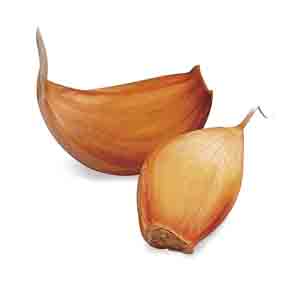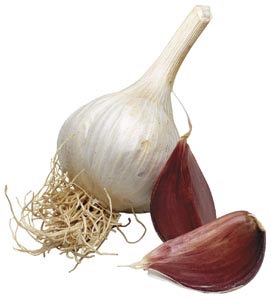

GLOVE AT FIRST SIGHT - By Allison Lindsay
Better Nutrition Magzine
Better Nutrition Magzine
| Sure, we know all foods derived from plants are rich in health-promoting phytonutrients -- but why all the fuss about garlic? Is it actually superior to other nutritious plant foods? Forget the 5,000 years of folk medicine or that whole vampire thing. We researched garlic and garlic supplements so we could sift out fact from fiction, the healthful from the hype. Some of what we discovered might surprise you. |  |
|
What's in It?
For years, scientists pegged allicin as garlic's key beneficial component. But allicin is quite volatile, and other forms of garlic that contain no allicin -- cooked, steamed, microwaved and aged garlic extract -- still exhibit medicinal advantages. Garlic's 100 compounds may work synergistically, and its secret weapon may turn out to be its more stable compound, S-allyl cysteine. Some of garlic's components are: * S-allyl compounds: S-allyl cysteine and other water-soluble sulfur amino acids * Allicin: alliin converts to allicin when the clove is crushed, chopped or chewed * Antioxidants: organosulfur compounds and flavonoids such as allixin neutralize free radicals * Selenium: an important dietary mineral * Saponins: steroid substances with antibacterial and antifungal actions * Carbohydrates: sugars, fructans and pectins * Proteins, vitamins and minerals: minute quantities |
|
| What Is Aged Garlic Extract? Why are some supplements promoted as "aged garlic extract" (AGE)? Although some say the fermentation of aging destroys some components, aging extracted garlic in diluted alcohol without heat for up to 20 months appears to: * Convert unstable allicin to stable beneficial compounds * Increase the S-allyl compound content * Raise antioxidant activity * Create the tumor-inhibiting compound S-allyl mercaptocysteine, which isn't found in other forms of garlic * Remove odor better |
|
| How to Take It and How Much ? These dosages are for adults only: * Fresh Clove: 2-4 grams daily of fresh, minced garlic clove -- each clove is about 1 gram * Capsules or Tablets: 600-900 milligrams (mg) daily of freeze-dried garlic standardized to 1.3 percent alliin or 0.6 percent allicin * Infusion: 4 grams daily in 150 milliliters (mL) (5 ounces) of water * Fluid Extract: 4 mL (0.13 ounces) daily of solution in ratio of 1 gram:1 mL * Tincture: 20 mL (0.66 ounces) daily of solution in ratio of 1 gram: 5 mL * Oil: 0.03-0.12 mL three times per day |
|
| What Are Its Benefits? Garlic doesn't absolutely prevent any disorder. But studies suggest it lowers the risk of numerous conditions. We assessed the evidence. * Anthrax Inhibitor: The claim that garlic is effective against anthrax is an urban legend. * Free Radical Scavenger: Research shows that garlic extract, especially aged, boosts cell glutathione, which fights free radicals -- linked to cancer and aging -- and supports immunity. * Atherosclerosis: Garlic fights blood clotting and plaque, preventing atherosclerosis, which can lead to a heart attack or stroke. In animal studies, it lowers homocysteine. * Bronchitis: Garlic thins mucus, easing the symptoms of bronchitis. * High Blood Pressure: Research indicates that garlic lowers blood pressure slightly. * High Cholesterol: Numerous studies have concluded that garlic lowers cholesterol, triglycerides and LDL, the "bad" cholesterol -- but only slightly. More tests are needed. * Cancer: A cancer cure? Definitely not. But animal studies suggest that garlic provides activity against certain cancers. People who eat more garlic are less prone to breast, prostate, laryngeal, and especially colon and stomach cancers. Supplements have not been as thoroughly studied for cancer benefits, but they contain the same components. * Common Cold: In one study, people received garlic supplements or a placebo for 12 weeks during the cold season. The garlic group had fewer colds and, when faced with a cold, their symptoms lasted for a shorter time. * Dementia: Researchers have found that AGE prevents frontal lobe degeneration, improves memory and extends life-span in mice. * Diabetes: Preliminary tests suggest garlic may lower blood sugars, although one study found that garlic worked no better than placebo. More research is warranted. * Ear Pain: In one study, children with the painful ear infection otitis media were given ear drops of an herbal combination that included garlic. The combination worked as well as prescription. However, the sampling was small. * Immune System: Blood samples from humans given garlic powder for 3 months indicated that their immune cells had a greater capacity to engulf E. coli bacteria. Also, substances in garlic kill H. pylori, a stomach bacterium linked to ulcers and stomach cancer. Garlic supplements can increase the activity of immune cells known as macrophages, which kill invaders. * Intestinal Parasites: Lab tests indicate huge quantities of garlic may fight roundworm, the most common intestinal parasite. But garlic's antiparasitic properties have not yet been tested on humans. * Toxicity: Very limited test tube experiments suggest that garlic supplements may reduce the risk of heart and liver toxicity in patients receiving potent anticancer drugs. * Tuberculosis: Numerous test tube studies have proven that garlic extract inhibits the growth of different bacteria, including Mycobacterium tuberculosis, the organism causing tuberculosis. But massive concentrations of extract were needed to slow the growth of M. tuberculosis, prompting speculation that combining garlic extract or garlic oil with drugs may prove effective -- eventually. |
|
| Avoid Garlic If... Garlic contains active substances that can trigger side effects or interact with other herbs, supplements or medications. And it's a strong blood thinner. Do not take garlic supplements if you: * will soon undergo surgery or deliver a baby * have hemophilia * have kidney disease * are pregnant or breastfeeding * are a child, unless your doctor * prescribes it * take medications, such as indo-methacin, dipyridamole or aspirin * take blood-thinning meds such as warfarin or aspirin * take diabetes medications known * as sulfonylureas (glimepiride, glyburide and chlorpropamide) * take protease inhibitors that treat HIV, such as indinavir, ritinavir or saquinavir * take statins to lower cholesterol -- atorvastatin, pravastatin or lovastatin, for instance -- unless you check with your doctor first * take blood pressure-lowering medications called ACE inhibitors -- including enalapril, captopril or lisinopril -- without getting your practitioner's okay |
|
| Most Popular Varieties The allium family includes onions, leeks, shallots, chives, green onions and garlic. There are about 300 different varieties of garlic -- or Allium sativum -- grown worldwide. The most common are: * white-skinned or Californian * American * Chileno * green garlic * Italian |
 |
|
Thank you for Better Nutrition Magzine
|
|